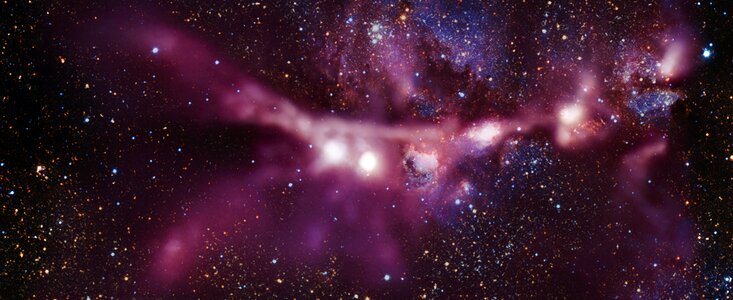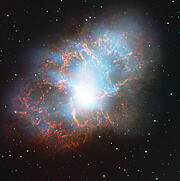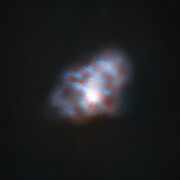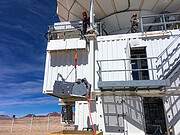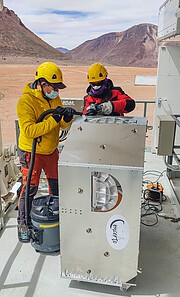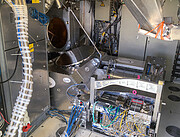Mitteilung
Die Show kann beginnen: Das APEX-Instrument CONCERTO nimmt den Betrieb auf
6. Juli 2021
Ein aufregendes neues Instrument, ein Spektrometer namens CONCERTO, hat erfolgreich seine ersten Beobachtungen gemacht: Testbilder des Katzenpfotennebels und des Krebsnebels. Das Instrument, das an dem von der ESO betriebenen Atacama Pathfinder Experiment (APEX) installiert ist, wird den Astronomen helfen, die mysteriöse, längst vergangene kosmische Epoche zu erforschen, in der die ersten Sterne aufleuchteten.
Das Hauptziel von CONCERTO, was für CarbON CII line in post-rEionisation and ReionisaTiOn epoch (engl. für Kohlenstoff CII-Linie in der Post-Reionisations- und Reionisations-Epoche) steht, ist es, die Geburt der ersten Generation von Sternen zu untersuchen. Dazu wird es kosmische Objekte untersuchen, die sich zwischen 600 Millionen und 1,2 Milliarden Jahren nach dem Urknall gebildet haben. Diese Ära, die als kosmische Reionisation bekannt ist, ist schlecht verstanden, aber entscheidend in der Geschichte des Kosmos. Sie markiert den Übergang zwischen den „dunklen Zeitaltern“ – einer sehr obskuren Periode im Leben des Universums, in der sich noch keine Sterne gebildet hatten – und der Zeit, in der sich die am weitesten entfernten Galaxien, die wir heute im Universum sehen, bildeten. CONCERTO wird auch entfernte Galaxienhaufen und Sternentstehungsgebiete in unserer Milchstraße kartieren.
Als Instrument, das in der Lage ist, den Himmel bei Frequenzen zwischen Infrarot- und Radiowellen abzutasten, wird CONCERTO die Strahlung untersuchen, die von ionisierten Kohlenstoffatomen ausgesendet wird, einem der wertvollsten Indikatoren für die Sternentstehung in den frühen kosmischen Zeiten. „Das Ziel, Licht auf die Reionisationsperiode zu werfen, ist sehr schwierig, da das Signal, nach dem wir suchen, sehr klein ist“, sagt CONCERTOs Projektleiter Guilaine Lagache vom Laboratoire d'Astrophysique de Marseille in Frankreich. „Wir werden dies mit einer völlig innovativen und experimentellen Beobachtungstechnik angehen, die wir Intensitätskartierung nennen. CONCERTO wird das erste Instrument der Welt sein, das eine Intensitätskartierung der urzeitlichen Kohlenstoffstrahlung in einem großen Himmelsbereich durchführt.“
„CONCERTO ist völlig einzigartig am APEX“, sagt ESO-Astronom und APEX-Projektwissenschaftler Carlos De Breuck. „Die anderen Instrumente konzentrieren sich entweder auf die Bildgebung oder die Spektroskopie, aber nicht auf beides, wie CONCERTO es tut. Und was die Bildgebung angeht, so ist es mit einem Durchmesser von etwa 20 Bogenminuten am Himmel das mit Abstand größte Sichtfeld, das jemals bei APEX verwendet wurde.“ Das neue Instrument hat die LArge APEX BOlometer CAmera (LABOCA) ersetzt und ermöglicht eine vierfache Verbesserung in Bezug auf das Sichtfeld.
Die Inbetriebnahme von CONCERTO markiert das Ende des Installationsprozesses, der mit der Lieferung des Instruments zum APEX-Standort in der Chanjantor-Hochebene in der chilenischen Atacama-Wüste Ende März 2021 begann.
Die COVID-19-Pandemie stellte eine große Herausforderung für das CONCERTO-Team dar, das es schaffte, das Instrument für den vollständig ferngesteuerten Betrieb vorzubereiten, es nach Chile zu verschiffen und es unter strengen Gesundheits- und Sicherheitsbedingungen am APEX-Teleskop zu installieren. „Ein großer Teil dieses Erfolges kommt vom Teamgeist und der Tatsache, dass wir alle mit Leidenschaft und Entschlossenheit arbeiten“, sagt CONCERTOs Instrumentenwissenschaftler Alessandro Monfardini vom Institut Néel in Grenoble, Frankreich. Das Team bedankt sich auch bei den APEX-Mitarbeitern vor Ort für ihr Engagement und ihre Hilfe bei der Installation und dem Testen des Instruments.
Weitere Informationen
CONCERTO wurde vom Europäischen Forschungsrat unter der Fördervereinbarung Nr. 788212, von der Exzellenzinitiative Aix-Marseille (Frankreich) und LabEx FOCUS (Frankreich) gefördert. Die am CONCERTO-Konsortium beteiligten Institute sind das Laboratoire d'Astrophysique de Marseille (LAM; Frankreich), das Institut Néel (Frankreich), das Laboratoire de Physique Subatomique et de Cosmologie (LPSC; Frankreich), das Institut de Planétologie et d'Astrophysique (IPAG; Frankreich) und die Astronomy Instrumentation Group an der University of Cardiff (Großbritannien). Das Institut Néel, LPSC und IPAG sind Laboratorien des Centre National de la Recherche Scientifique (CNRS) und der Université Grenoble Alpes (UGA). LAM ist ein Labor des CNRS und der Universität Aix-Marseille.
APEX ist eine Zusammenarbeit zwischen dem Max-Planck-Institut für Radioastronomie (MPIfR), dem Onsala Space Observatory (OSO) und der ESO. Der Betrieb von APEX in der Chajnantor-Hochebene ist der ESO anvertraut.
Links
Kontaktinformationen
Guilaine Lagache
Projektleiter von CONCERTO
Laboratoire d'Astrophysique de Marseille
Marseille, Frankreich
Tel: +33 6 50 77 35 45
Email: guilaine.lagache@lam.fr
Alessandro Monfardini
Instrumentwissenschaflter von CONCERTO
Institut Néel
Grenoble, Frankreich
Tel: +33 4 76 88 10 52
Email: alessandro.monfardini@neel.cnrs.fr
Carlos De Breuck
ESO APEX Projektwissenschaftler
Garching bei München, Deutschland
Tel: +49 89 3200 6613
Email: cdebreuc@eso.org
Bárbara Ferreira
ESO Medienmanagerin
Garching bei München, Deutschland
Tel: +49 89 3200 6670
Email: press@eso.org
Über die Mitteilung
| ID: | ann21010 |
Our use of Cookies
We use cookies that are essential for accessing our websites and using our services. We also use cookies to analyse, measure and improve our websites’ performance, to enable content sharing via social media and to display media content hosted on third-party platforms.
ESO Cookies Policy
The European Organisation for Astronomical Research in the Southern Hemisphere (ESO) is the pre-eminent intergovernmental science and technology organisation in astronomy. It carries out an ambitious programme focused on the design, construction and operation of powerful ground-based observing facilities for astronomy.
This Cookies Policy is intended to provide clarity by outlining the cookies used on the ESO public websites, their functions, the options you have for controlling them, and the ways you can contact us for additional details.
What are cookies?
Cookies are small pieces of data stored on your device by websites you visit. They serve various purposes, such as remembering login credentials and preferences and enhance your browsing experience.
Categories of cookies we use
Essential cookies (always active): These cookies are strictly necessary for the proper functioning of our website. Without these cookies, the website cannot operate correctly, and certain services, such as logging in or accessing secure areas, may not be available; because they are essential for the website’s operation, they cannot be disabled.
Functional Cookies: These cookies enhance your browsing experience by enabling additional features and personalization, such as remembering your preferences and settings. While not strictly necessary for the website to function, they improve usability and convenience; these cookies are only placed if you provide your consent.
Analytics cookies: These cookies collect information about how visitors interact with our website, such as which pages are visited most often and how users navigate the site. This data helps us improve website performance, optimize content, and enhance the user experience; these cookies are only placed if you provide your consent. We use the following analytics cookies.
Matomo Cookies:
This website uses Matomo (formerly Piwik), an open source software which enables the statistical analysis of website visits. Matomo uses cookies (text files) which are saved on your computer and which allow us to analyze how you use our website. The website user information generated by the cookies will only be saved on the servers of our IT Department. We use this information to analyze www.eso.org visits and to prepare reports on website activities. These data will not be disclosed to third parties.
On behalf of ESO, Matomo will use this information for the purpose of evaluating your use of the website, compiling reports on website activity and providing other services relating to website activity and internet usage.
Matomo cookies settings:
Additional Third-party cookies on ESO websites: some of our pages display content from external providers, e.g. YouTube.
Such third-party services are outside of ESO control and may, at any time, change their terms of service, use of cookies, etc.
YouTube: Some videos on the ESO website are embedded from ESO’s official YouTube channel. We have enabled YouTube’s privacy-enhanced mode, meaning that no cookies are set unless the user actively clicks on the video to play it. Additionally, in this mode, YouTube does not store any personally identifiable cookie data for embedded video playbacks. For more details, please refer to YouTube’s embedding videos information page.
Cookies can also be classified based on the following elements.
Regarding the domain, there are:
- First-party cookies, set by the website you are currently visiting. They are stored by the same domain that you are browsing and are used to enhance your experience on that site;
- Third-party cookies, set by a domain other than the one you are currently visiting.
As for their duration, cookies can be:
- Browser-session cookies, which are deleted when the user closes the browser;
- Stored cookies, which stay on the user's device for a predetermined period of time.
How to manage cookies
Cookie settings: You can modify your cookie choices for the ESO webpages at any time by clicking on the link Cookie settings at the bottom of any page.
In your browser: If you wish to delete cookies or instruct your browser to delete or block cookies by default, please visit the help pages of your browser:
Please be aware that if you delete or decline cookies, certain functionalities of our website may be not be available and your browsing experience may be affected.
You can set most browsers to prevent any cookies being placed on your device, but you may then have to manually adjust some preferences every time you visit a site/page. And some services and functionalities may not work properly at all (e.g. profile logging-in, shop check out).
Updates to the ESO Cookies Policy
The ESO Cookies Policy may be subject to future updates, which will be made available on this page.
Additional information
For any queries related to cookies, please contact: pdprATesoDOTorg.
As ESO public webpages are managed by our Department of Communication, your questions will be dealt with the support of the said Department.
